Description
Sex and Relationships Education for Young People and Adults with Intellectual Disabilities and Autism provides practical guidance for professionals working with, and parents or carers of, people with co-occurring autism and intellectual disabilities, on how to deliver and adapt sex and relationships education. People with autism have specific characteristics which can make interpersonal relationships challenging. When this is combined with intellectual disabilities it can make responding to these challenges even more difficult. While positive experiences can enhance quality of life considerably, negative experiences can be life damaging.
The publication provides the resources and guidance needed to provide education tailored to support young people and adults to manage intimate relationships, acknowledging not only the characteristics of both conditions, but also how they interact. Based on the authors’ research study drawing on the extensive experience of practitioners working in this area, as well as the authors’ own clinical and educational expertise, it aims to provide professionals, carers and parents with the knowledge and skills to best prepare for and meet the unique educational needs of this population. Needs might include difficulties with learning, social communication, sensory sensitivities, interpreting subtleties in body language and social cues, and understanding the complex social rules involved in different relationships.
The contents address the adaptations of formal interventions and informal education and discussions about sex and relationships, supplemented by case studies, session plans, online illustrated worksheets and resource lists.
Audience
Health, education and social care professionals who work with people with cooccurring autism and intellectual disabilities in education, health, residential and community settings, and parents and carers
This publication can be utilised during the following RQF qualifications:
Level 2 Diploma in care; Level 3 Diploma in Adult care;
Level 4 Diploma in Adult care Level 4 and 5 Diplomas in Adult Care, Leadership and Management.
Details
ISBN: 9781912755523
Publication Date: September 2019
Contents:
- Introduction
- Understanding the impact of autism and intellectual disabilities
- Preparing to talk about sex and relationships
- Setting up sex and relationships education sessions
- Adaptations and teaching methods
- Supporting successful relationships in the real world
Authors
Dr Kelly Asagba
Kelly is a Clinical Psychologist who completed her clinical psychology doctoral training at the Salomons Centre for Applied Psychology, Canterbury Christ Church University, in 2017. Her doctoral thesis focused on how sex and relationships education can be adapted for people with both intellectual disabilities and autism. She has worked in various NHS services for both children and adults with intellectual disabilities and autism, and more recently in perinatal mental health services. Her interests in the areas of intellectual disabilities and autism relate to sexuality, relationships and positive behaviour support. She also has interests in perinatal psychology and promoting positive parent-child interactions.
Professor Jan Burns
Jan is a Professor of Clinical Psychology at Canterbury Christ Church University, UK. Previously, Jan has worked as a Clinical Psychologist with people with intellectual disabilities in the NHS and has carried out research in this area throughout her career. She has previously been the Programme Director for the Salomons Institute Doctorate in Clinical Psychology and has contributed to the development of the profession in the UK. Jan’s research interests relating to people with intellectual disabilities include gender, sexuality, identity, health and sport. In 2015, Jan was awarded a Member of the British Empire (MBE) medal for her work with people with intellectual disabilities.
Dr Sophie Doswell
Sophie works across child and adult NHS learning disability services in north London, UK. Sophie has worked as a Clinical Psychologist within NHS learning disability services since qualifying in 2001 and has a wide range of clinical, research and service development interests within and outside of the NHS including promoting identity and reducing stigma, utilising positive approaches including engaging in sport, intensive interaction and non-violent resistance and supporting individuals in difficult situations such those who are institutionalised and in temporary accommodation.

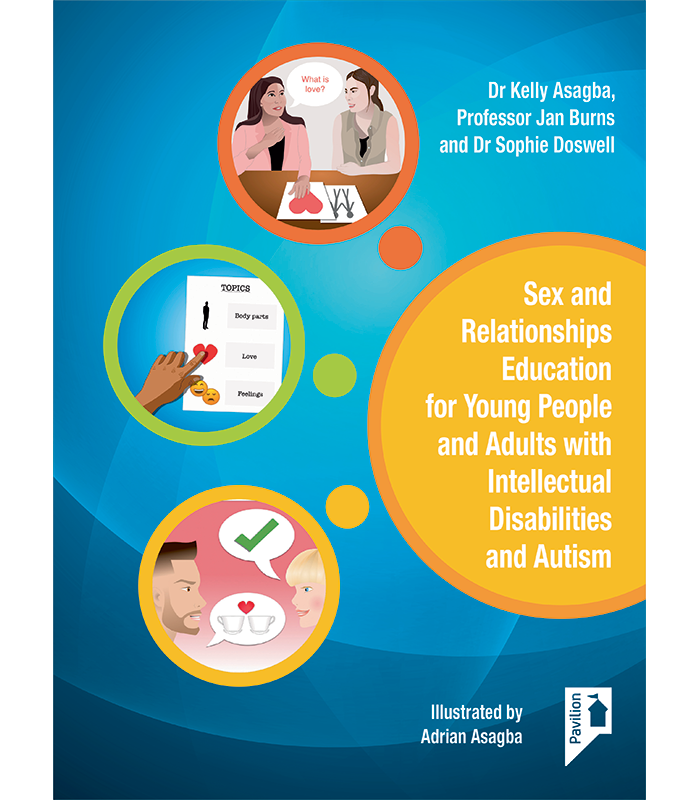
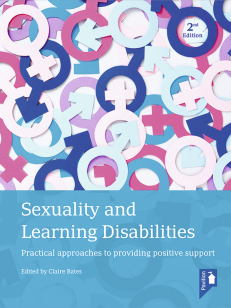
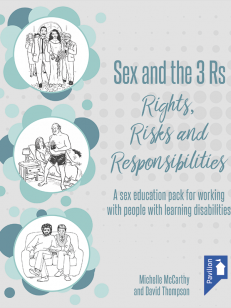
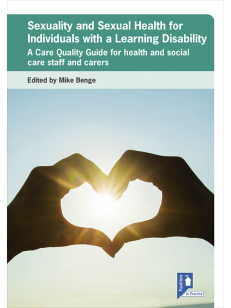
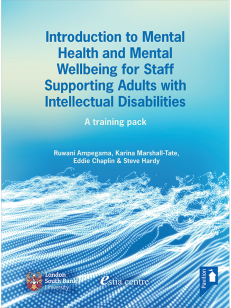
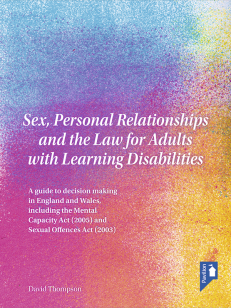
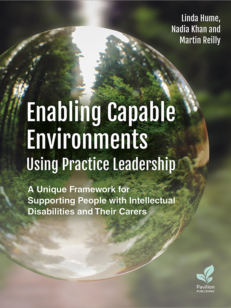
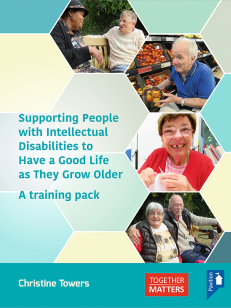
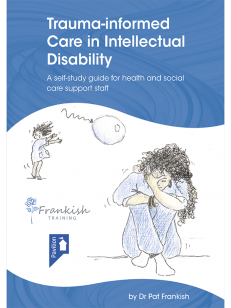
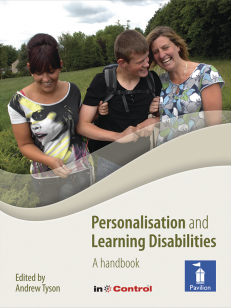
Michael Rimmington Autism consultant and trainer ProACT Autism Consultancy Training –
This book is a compact and easily accessible guide on how to approach the sometimes-challenging subject of sex and relationships education for people with intellectual disabilities and autism. The authors, who have extensive experience in this field, present a series of texts and exercises offering a sequential approach to sex and relationships education, with each chapter acting as a stand-alone reference point if needed. Admittedly, this is more of a handbook (as acknowledged by the authors) as opposed to a rigidly referenced academic text.
The opening chapter is predominantly a clarification of the terms used within the text and a guide to how the book is structured – this is still useful information, however, as the book uses a range of ‘pop-up’ text boxes, which serve different functions throughout. The core of the book starts at the second chapter which offers a concise overview regarding the impact of autism and intellectual disabilities. The authors consider key areas such as cognitive functioning, emotional regulation, gender differences and sensory and communicative difficulties. Chapter 2 serves both as a solid introduction to autism and intellectual disability and as an efficient refresher for those already familiar to the subject.
Despite its brevity, this book very effectively serves its purpose as a guide to planning and implementing sex and relationships interventions, and Chapter 3 initiates that process by discussing some of the necessary planning and information gathering needed before interventions can begin. This section helps the reader identify key areas such as current sexual knowledge, mental capacity, and high-risk areas which may need addressing first. The chapter covers the use of various assessment tools, which are easily found through the ‘useful resources’ chapter at the end of the book. The authors also discuss the different types of interventions which could be used (such as formal, informal, individual or group) and their advantages and disadvantages, as well as the use of learning contracts and the importance of preparing other people prior to the session. This is also the first of the five main chapters which conclude with a useful section of functional worksheets.
Moving onward through the planning process, Chapter 4 discusses some of the skills needed to safely run sessions relating to sex and relationships – including setting ground rules and professional boundaries and how the sessions could be effectively structured. The authors also briefly cover how to deal with issues around safeguarding. Chapter 4 concludes with guidance on what topics could be covered during a sex and relationships intervention, linking into a useful ‘topics checklist’ at the end of the chapter. This simple tool breaks down the extensive and potentially overwhelming fields of ‘sex’ and ‘relationships’ into easily managed sub-topics.
In Chapter 5 the authors discuss how to make adaptations for learners during sex and relationships training sessions, alongside suggestions for a variety of teaching methods. Predominantly these are focused on approaches to communication, and these may be familiar to many readers – although, again, these sections can be used as a helpful refresher. This chapter also offers important guidance on how to make adaptations for memory and attention as well as specific teaching techniques such as circles of intimacy, social stories, role play and the use of visual media. Throughout most chapters of this book, the authors offer real life examples to illustrate key points and these are most effectively used in this chapter and the subsequent one.
In the last of the descriptive segments of the book (as the final two sections are a summary and a list of useful resources respectively), Chapter 6 covers the important issue of how to put things into practice and support successful relationships in the real world. The authors discuss approaches such as practising for an upcoming event, and analysing situations after the fact, alongside the role which could be played by the person’s support system. Unfortunately for such an important topic this section is disappointingly succinct, amounting to only one or two paragraphs for each of the key learning points, although useful worksheets are provided at the end.
Within this book, the authors offer parents and professionals a well-structured, but brief approach to teaching sex and relationships interventions. The examples given place the learning into context well and the book is full of practical and useful tools and links to wider resources. This is a very good and easily accessible guide to approaching a subject which can be frequently challenging, and one which is often left unaddressed as a result.
Prof Michelle McCarthy, Tizard Centre –
Information, advice and training materials on sex and relationships education (SRE) for people with either intellectual disabilities (ID) or autism have existed for some time. But guidance on SRE for people with both conditions is thin on the ground and therefore this handbook by Asagba, Burns and Doswell is timely and welcome.
The handbook begins by providing readers with background information on how ID and autism might impact the personal and intimate lives of individuals. Clear examples of are given as to how some of the common features of ID and autism can have an impact on forming and maintaining relationships.
Chapter 2 covers issues relating to preparing the ground for discussion about sex and relationships, including contextual issues like assessing risk and capacity. Informal and formal, one-to-one and group learning are covered in this section.
The handbook contains numerous worksheets throughout which are designed to help those supporting people with ID and autism undertake the work. There are lists of suggested topics to cover in SRE, plus tips for adapting communication and ideas for the best methods to use.
Chapter 6 offers useful ideas for supporting successful relationships in the real world setting eg in groups, through role play and group discussions. The benefits and risks of using the internet as a learning tool are also highlighted, though I felt this section could have been expanded considerably. Whilst the key dangers are listed, I think many carers, especially of adults, would benefit from some more specific guidance on how to manage situations whereby vulnerable people are easily able to access potentially damaging material with a just few clicks eg violent pornography or politically extremist material.
The pack ends with a very useful resource list of other materials and sources of information.
Inevitably this handbook has its limitations, as all resources do. For example, those who are looking for advice on managing risks when a person with ID and autism gets sexually involved with a person without an ID will not find it here. Yet, professionals and family carers are often, rightly, worried about the inherent, and potentially problematic, power imbalances in such relationships.
Likewise, any parents of young people with ID and autism who are concerned about how best to support their son or daughter who identify as trans or non-binary will not find such advice in this handbook. Given that teenagers and young people with autism, especially girls, are over-represented in those referred for clinical services related to gender identity (GIDS Evidence Base 2019), this was perhaps a missed opportunity.
Notwithstanding the above examples, this handbook is a very useful resource, which I highly recommend.
Dr Claire Bates Supported Loving, Quality Analyst, Choice Support –
As part of my role heading up the National Supported Loving Network I am often asked for advice on delivering relationships and sex education (RSE) to people with learning disabilities and autism. I will be recommending that anyone working with this client group to deliver RSE to read this book. I found it immensely useful, and really valued how practical it was. I initially thought it was a sex education pack but was pleased to find it was a handbook focusing on adapting RSE to meet the needs of adults with learning disabilities and autism. The book has an informative chapter explaining how the specific combination of having both a learning disability and autism can impact on learning in this area. This is very helpful as the combination is rarely explored. The majority of the book focuses on practical approaches, complete with helpful worksheets, on areas such as setting up RSE sessions and how to adapt sessions. The book gives clear guidance on the different types of sessions educators can use (informal/ formal/ group/ individual) and what works best and when. The book gives advice on how to involve parents and /or carers to best support the person, which is appreciated. I expect this book would be beneficial to anyone delivering RSE but particularly to people who are new to working with people with learning disabilities and/ or autism. The book ends with a helpful summary of useful resources which are invaluable. I have added this to our recommended resources at Supported Loving.